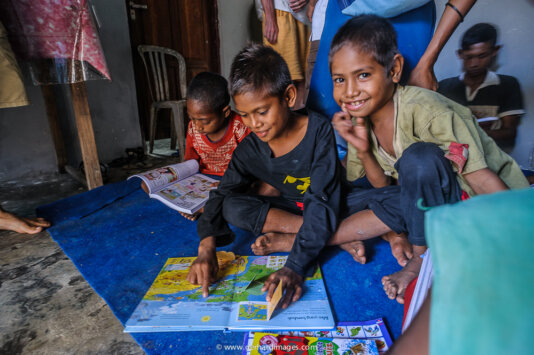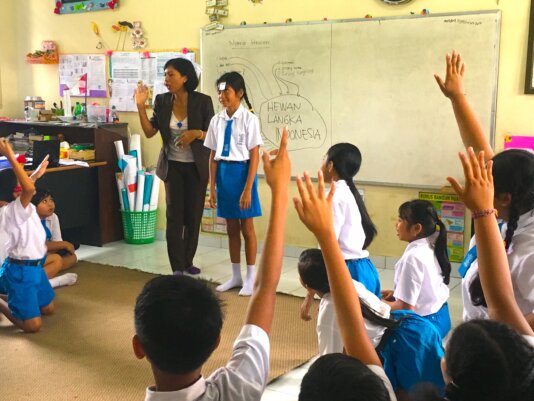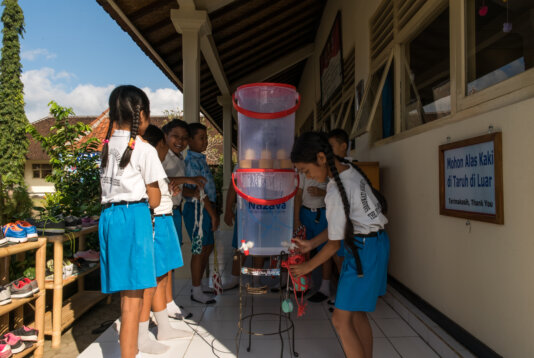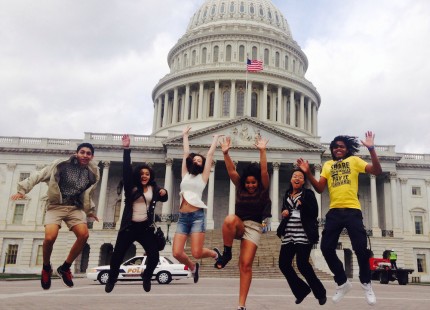- About
- Topics
- Story
- In-Depth
- Picks
- Opinion
- News
- Donate
- Signup for our newsletterOur Editors' Best Picks.Send
Read, Debate: Engage.
| August 06, 2021 | |
|---|---|
| topic: | Conservation |
| tags: | #Indonesia, #conservation, #environmental education, #NGO |
| located: | Indonesia |
| by: | Magdalena Rojo |
"People in the country are more and more aware of the problem with plastic pollution. That is why we created our first program dedicated to the ‘zero waste’ concept," Petr Hindrich explained in an interview for FairPlanet.
The Czech surfer has been living in Bali since 2008, and apart from surfing he has also been looking for ways to enhance Indonesians’ connection to their habitat, which is one of the most biodiverse environments in the world.
Founded six years ago, Hindrich’s organisation, Green-Books.org, originally focused on establishing libraries that contained environmental books. Nowadays, it prepares curriculums for schools across Indonesia.
FairPlanet: How did the whole project start?
Petr Hindrich: The beginning was spontaneous. I went for a surf trip with my friends to Sumba island, which is two islands east from Bali. We got stuck in a small village two hours from the main road and spent more than one week with the local villagers there.
That was the moment when I realised that I wanted to do something about environmental education because I saw local kids surrounded by beautiful nature but they did not know much about it. They did not know how to protect it, how to appreciate it.
Indonesia has one of the most biodiverse ecosystems, both marine and terrestrial, in the world. Why do local kids not appreciate nature?
There are many reasons why they do not even observe it. It is not common to spend free time walking outside or climbing mountains here. Plus, the hot climate does not help. There is also not much public transportation so it is not easy for them to go [places].
People are scared of the unknown, and because Indonesian kids and the general population do not know much about nature, they are scared of it.
We try to make kids curious about nature and we hope they will fall in love with it. And, subsequently, they will protect it.
I believe investment in education is the most impactful because it will last for years.
From what I know, environmental education does not exist as such in Indonesian schools. Can you describe a little bit more about how kids learn at local schools? What is the education system like?
Typically, a teacher stands in front of the blackboard and speaks to the students who copy his words into their notebooks. They memorise notes for the tests, so education here is very tests-oriented, unfortunately.
Indonesia scores amongst the worst in Asia at PISA tests [tests that examine the level of text comprehension and one’s ability to apply mathematics in daily life]. Kids do go to school and they like it, but they do not learn much.
Indonesia is a developing country and the government does not really invest in education, so the occupation of a teacher is very underpaid, especially in rural areas. The salary in those areas can get as low as 50 dollars per month, so, of course, teachers are not motivated to perform perfectly at school. There is not a big number of teachers who are really devoted to their work.
And, on top of it, there are up to 35-40 kids in a classroom. So even if there is an option of a new thematic-based curriculum nowadays [a kind of curriculum in which one does not teach by subject but by topic, and more subjects can be merged to cover one topic], which is pretty revolutionary, teachers need to learn how to teach this way. Many of them still teach the same way they used to.
The Green-Books.org philosophy is predicated on three main pillars. The first is eco-education, which is very interactive. Using your knowledge about how education works in Indonesia, how do you get your environmental programs into schools?
In general, there is no demand for environmental education. We started with the bottom-up approach. We were looking for teachers who applied for our programs. We made sure that they wanted to do it because they found our programs beneficial. But we also needed to incentivise them with some motivational rewards.
At the moment, we are already more connected, so at this point we are also approaching the teachers through cooperation with local educational departments.
We are also trying to match our curriculums with the national curriculum. We will first implement it in a particular school. If it works, hopefully we can propose it on the local level and maybe at the national level.
You now have two curriculums prepared, the first one being Zero Waste School Programme and another one is called Single Use Plastic Free School Programme. Why these topics?
In Indonesia, plastic is quite cheap and people get everything in plastic. The general public has started to speak about plastic pollution already, so it is becoming a topic here. There was a demand for it and there is already some public awareness about plastic waste.
How did you create these two programs?
At the very beginning we did not have any connections and we did not know any teachers, we did not know the educational system, we just knew that environmental education is needed.
The knowledge we had from the Czech Republic told us that books were a good tool on how to introduce environmental education. So we sourced books about the environment and we distributed them to the communities. But over time we found out that there is not much of a reading culture in Indonesia [...] So it was not that effective and we started to develop what we called eco-activities.
Later on, we put those activities together into the first program on bio diverse conservations the same way we developed the programs on plastic waste - from single activities.
Now it is a step-by-step learning curriculum with sixteen lessons.
The second pillar of your work is educating local educators. Do teachers also approach you?
Yes. They either hear about us from their colleagues, it is kind of word-of-mouth, or they find us on social media.
At the moment, about a hundred teachers teach these programs. How has the pandemic impacted your work?
The Covid-19 pandemic is shifting the school attendance: half of the kids go to school for one part of the week and another half for the rest of the week. It means limited time, so we need to update our curriculums and make them more concise.
Also, most of our activities are interactive, they include movement, games or puppet theatre, songs, experiments, group work. For example, in the Zero Waste School Programme we encourage kids to start composting. Now we have to adjust all these for online circumstances.
Another wave of Covid has just come to Indonesia, and we are back to online education, which is not really working in Indonesia because not all the kids have their own telephones, gadgets etc. They use their parents' phones to get instructions from the teacher and to respond. Often, they do not have enough data to connect.
How do you know your activities work?
We ask educators to give us feedback from the activities they do. They send us pictures or videos and that is how we see that they implement the program.
After that, we incentivise the schools with alternatives to single-use plastics, such as reusable bottles, eco-bags, water filters, zero waste launch kits, including binoculars. They are motivators but also tools to practice a sustainable lifestyle.
This is the third pillar of our work. We have started a new project with a German partner that specialises in behavioral change and anthropology. So that part of the project will be measuring the impact with research.
What is your goal for the Green-Books.org project
We want to reach millions of kids in Indonesia. But [in order to] scale up our activities and have such an impact it is necessary to push environmental education from the top.
Image: Green-Books.org.
By copying the embed code below, you agree to adhere to our republishing guidelines.



